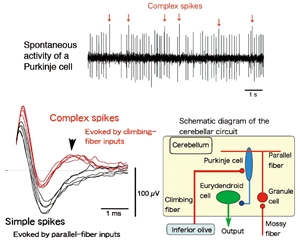Research
Fishes have adaptively radiated to various environments while share basic anatomical and functional features of the brain with other vertebrates including humans. The aim of our research is to reveal neural control mechanisms underlying various behaviors of fish. We believe our research in future helps us to understand not only fish but also ourselves.
1) Assoc. Prof. M. Yoshida is interested in biological basis of mind in various animals including fish. His research strategy is combining behavioral observation and recordings of brain neural activities. He aims to elucidate the mind-brain relationship using a simple vertebrate system.
Go to the Laboratory's Home page
Keywords
Behavior, Brain, Comparative psychology, Neuroethology

Cerebellar circuit involved in fear learning

Behavioral experiment on agonistic behavior in zebrafish
Recent Publications
Soh, Z., Matsuno, M., Yoshida, M., Tsuji, T. (2018) Real-Time Cameraless Measurement System Based on Bioelectrical Ventilatory Signals to Evaluate Fear and Anxiety. Zebrafish, 15 (2), 133-144.1
Matsuda, K., Yoshida, M., Kawakami, K., Hibi, M., Shimizu, T. (2017). Granule cells control recovery from classical conditioned fear responses in the zebrafish cerebellum. Scientific Reports, 7, 11865.
Yoshida, M., Kanto, Y., Tsuboi, M., Sakai, Y. (2013) Rapid acquisition of an appetitive conditioned response in an intertidal fish, Tridentiger trigonocephalus (Gobiidae), using an ethologically relevant conditioning paradigm, Behaviour, 150, 585-598.
Yoshida, M., Kondo, H. (2012) Fear conditioning-related changes in cerebellar Purkinje cell activities in goldfish. Behavioral and Brain Functions 8:52.


 Home
Home
